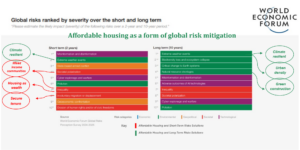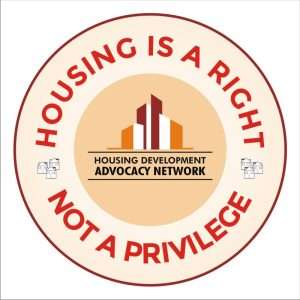Co-written by Ian Shapiro, Reall‘s CEO and Olivia Nielsen, Miyamoto International’s, Principal, Climate Resiliency.
Global risks are interconnected — an often repeated, yet profoundly important insight. The World Economic Forum’s Global Risks Report 2025 highlights the rapid evolution of risks that shape our collective future. Notably, while no short-term (two years) or long-term (ten years) risks are categorized as purely “economic,” the challenges posed by global supply chain disruptions and cost-of-living pressures are evident in our daily lives.
Meanwhile, “environmental” risks expand from two of the top ten short-term risks to five of the top ten long-term risks, occupying the top four slots. From the immediate threats of extreme weather events to long-term concerns like biodiversity loss and natural resource shortages, these challenges do not exist in isolation. They demand systemic solutions that address their interconnected nature.
Affordable housing could be one of the smartest dollar-for-dollar keystone investments to address these multifaceted risks, benefiting both people and the planet. Stable, resilient, and inclusive housing fosters societal cohesion, reduces climate-induced displacement, and mitigates ecological degradation. However, alongside the benefits, we must also acknowledge the cost of inaction. From the recent wildfires in Los Angeles impacting thousands of homes to the anticipated 2.5 billion additional urban residents in Africa and Asia within a generation, the risks of inaction are stark and escalating.

1. Affordable Housing and Short-Term Risks
Mitigating Extreme Weather Events (Rank 2)
As climate change accelerates, extreme weather events—floods, hurricanes, and heatwaves are becoming more frequent and severe. Resilient affordable housing can be a critical defense against displacement caused by these disasters. Elevated homes in flood-prone areas and structures with heat-resistant materials provide vulnerable communities with immediate protection and long-term stability. For example, affordable housing in Mozambique with circular screws for roof stabilization has shown remarkable resilience during hurricanes. Such low-cost solutions significantly reduce recovery costs and safeguard livelihoods

Reducing Societal Polarization (Rank 4)
Economic and spatial inequalities fuel societal polarization, creating segregated communities that foster mistrust. Affordable housing promotes mixed-income neighborhoods that encourage inclusion and collaboration. By designing shared spaces that bring diverse groups together, these neighborhoods can bridge divides, fostering a sense of community and reducing the risk of political fractures. In rapidly growing nations like Pakistan and Nigeria with projected population increases from 240 million to 380 million and 220 million to 400 million respectively by 2050—the limitations of urban sprawl underscore the need for smarter, inclusive urban planning.
Tackling Inequality (Rank 7)
The global housing shortage exacerbates inequality, forcing millions to allocate disproportionate income to substandard shelter. Affordable housing addresses this by offering stability and opportunities for social mobility. Families in stable housing can focus on education, health, and livelihoods, breaking cycles of poverty. In Africa and Asia, an untapped $17 trillion green asset class in affordable housing offers immense potential for both economic and social transformation, demonstrating the opportunity to align development goals with financial growth.
Managing Migration and Displacement (Rank 8)
Environmental and economic instability often result in forced migration. Strategic investment in affordable housing located in climate-resilient and economically vibrant areas can reduce displacement. Resilient communities, supported by affordable housing, act as a safety net for vulnerable populations, ensuring stability during shocks. Innovative rental and ownership models, such as seasonal migration options and AI-enhanced credit risk assessments for informal sector workers, are promising pathways for managing migration more effectively.

2. Affordable Housing and Long-Term Risks
Mitigating Biodiversity Loss and Ecosystem Collapse (Rank 2)
Urban sprawl is a leading contributor to biodiversity loss, replacing natural ecosystems with unchecked development. With 70% of the buildings needed by 2050 not yet constructed in Africa and Asia, the urgency for sustainable planning is immense. Compact, sustainable affordable housing curtails urban sprawl, reducing carbon footprints and preserving ecosystems. Green housing initiatives, including energy-efficient designs and recycled materials, not only address housing shortages but also promote biodiversity. Singapore’s green building policies exemplify how urban areas can coexist harmoniously with natural ecosystems.
Reducing Natural Resource Shortages and Critical Earth System Changes
Affordable housing projects emphasizing resource-efficient construction methods alleviate pressure on finite resources. Locally sourced materials, reduced construction waste, and renewable energy systems mitigate resource strain. These sustainable practices lower costs, making housing accessible for low-income populations. Programs like India’s Energy-Efficient Affordable Housing initiative showcase the scalability of resource-efficient development, proving their viability across diverse contexts.
Affordable housing is a proactive solution to some of the world’s most pressing risks. Addressing short-term threats like societal polarization and climate-induced displacement while tackling long-term challenges like biodiversity loss and resource shortages, affordable housing represents a keystone for global resilience and sustainability.
The risks of inaction are critical. Governments, developers, and financiers must elevate affordable housing as a central strategy to mitigate global risks. By acting now, we can build a more equitable, sustainable, and resilient future for all.
Source: Reall.net




